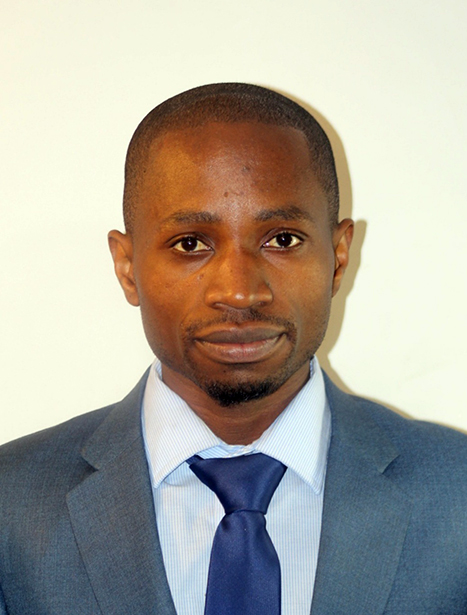Student Navigator
Weekly Navigator
Cybersecurity Scholarship Aligning Student with Bright Future

Life began turning around for Mmoleca Ehungwe in 2019. Drastic change is not new to him, though.
Ehungwe fled the war-torn Democratic of the Congo with his parents and two siblings at age four. From there, all his major life events would occur over 27 years in a place he never imagined ending up.
"I grew up in a refugee camp in Tanzania. I got my high school diploma, became a high school mathematics teacher, journalist, computer literacy trainer, and married in that refugee camp," said Ehungwe.
After immigrating to the United States three years ago with his wife and two young children, the soon-to-be father of three is on the cybersecurity career pathway at Virginia Peninsula Community College, formerly Thomas Nelson. And he recently won a CyberCorps Scholarship for Service (SFS).
The scholarship will cover his final year at the College in the fall. Funding will continue for two more years when he transfers to Old Dominion University to pursue a bachelor's degree in cybersecurity.
"This scholarship is an opportunity to help me achieve my short-, mid-, and long-term goals," said the information systems technology (IST) major.
Ehungwe, 30, knew early on technology was for him.
"I selected this major because I saw many open opportunities, and it aligns with my passion. From a young age, I was interested in technology and innovation. When I was 12, I made the goal of coming out with a technology solution, then commercializing it. I am committed to fulfilling this aim," he said.
Acceptance in the SFS program happened at the perfect time for Ehungwe. He had a 3.7 GPA when he applied in January and was working part-time. The program aims to recruit and train the next generation of information technology professionals, industrial control system security experts, and security managers to meet the cybersecurity mission needs of federal, state, local, and tribal governments.
Ehungwe must complete a summer internship with a local government office as part of the program and work three years for the government upon finishing his bachelor's degree. He will receive a stipend of $25,000 a year as an undergraduate. Full-time participation in his studies and related activities is required. So he is grateful for this funding that will allow to achieve education goals.
"One thing that inspires me the most in my pursuit of high education is how Americans invest in people's education. All these grants, scholarships, and more are outstanding," he enthused, crediting his academic advisor William Tweel for convincing him to apply.
"My advisor, he encouraged me a great deal. I became hopeful and confident so I worked hard to make sure I would meet the requirements to apply," said Ehungwe.
He also appreciates the support Associate Professor Michael Mann, who teaches IST, and math instructor Amanda Maule provided. They truly demonstrate a commitment to helping students reach academic and career goals, he emphasized.
"Especially in this COVID 19 crisis, they use innovative methods to ensure students succeed. These two are becoming my role models after my father," said Ehungwe.
Support navigating the College's ins and outs also came from TRiO for the Phi Theta Kappa honor society member. He thanked SaraLynn Georgen and Natasha Woods of TRiO saying "they provide exceptional help when I need it." TRiO is a federal program that serves students, who are first-generation college students, have documented disabilities, or who are from a lower economic background.
On top of it all, Ehungwe's positive attitude got him to this point. It shaped him throughout his time as a refugee in Tanzania. He reflected on how his immigration to the U.S. came about noting efforts by the humanitarian advocacy group United Nations Humanitarian Commissioner for Refugees (UNHCR) and the Refugee Support Center were key.
"There is a U.S.- backed program to help resolve the long-term problem for refugees. Me and my family were selected and qualified to come to this country," he said, pointing out that him and his wife had several interviews with immigration officials as part of the process.
Once in the U.S. settling in Newport News, he spent a lot of time doing research -- something he always does when considering any plan. It helps him identify obstacles and find solutions. He connected with human services agencies such as Commonwealth Catholic Charities, found a job, and learned about his higher education options.
He enrolled at the College in 2020 after taking GED classes as refreshers. Although bilingual (speaking his native Swahili and a second language French), Ehungwe realized English was necessary, so he also completed ESL courses.
With a cybersecurity career in his sights, he is optimistic about the future. He hopes to stay with a government job for a few years beyond the SFS program's mandatory three years to gain enough experience to eventually start his own company. The foundation higher education affords is his stepping stone.
"Each day is a step to move forward toward my goals. I meet expectations and more from the classes I am taking," mused Ehungwe, who serves as a volunteer pastor in his community gaining skills that help him "understand leaders' diverse challenges in organizations."
At the one-year mark of living in the United States, he and his wife applied for and were granted permanent-resident status. They will be eligible to apply for citizenship in 2024 after four years and nine months as permanent residents.
